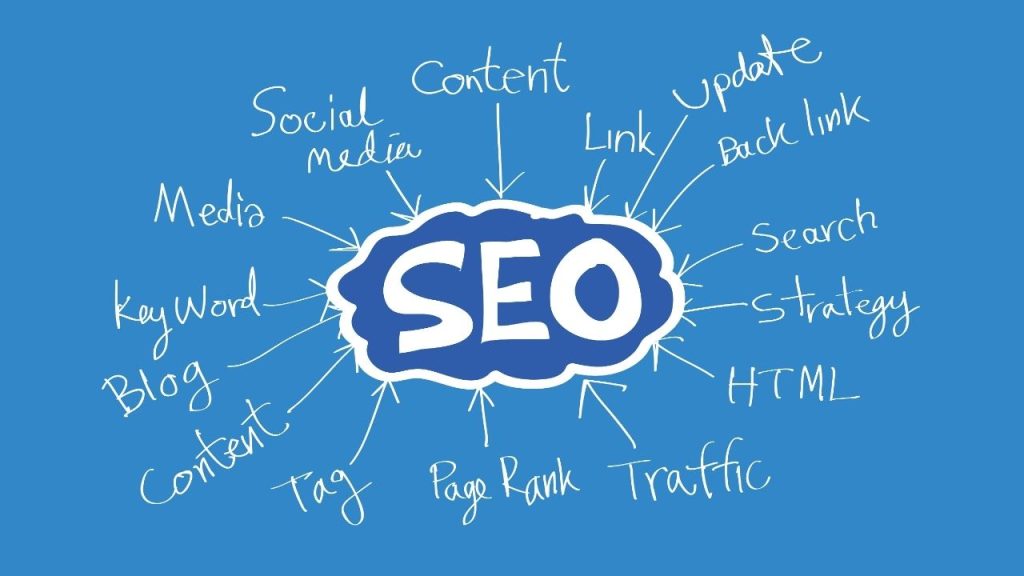Power of Online Visibility
In today’s digital age, if you want your business to thrive, having a strong online presence is imperative. This is where SEO marketing comes into play. SEO, or Search Engine Optimization, is the art and science of enhancing your website’s visibility on search engines like Google, Bing, and Yahoo. But what is SEO marketing, and why is it essential for your online success? In this comprehensive guide, we’ll delve into the world of SEO, demystify its core concepts, and provide actionable insights for achieving top rankings on search engines.
What is SEO Marketing?
SEO marketing, also known as search engine marketing, is a digital marketing strategy aimed at increasing the visibility and organic (non-paid) traffic to a website through search engine results. It involves optimizing various elements on a website, both on and off the page, to improve its ranking in search engine results pages (SERPs).
Significance of SEO in the Digital Landscape
In the digital landscape, where billions of web pages vie for attention, SEO is the compass that guides users to the most relevant and valuable content. It’s the process of aligning your website with the intent of users’ search queries, making your content more discoverable and accessible.
Understanding the Basics of SEO
Defining SEO
At its core, SEO is about enhancing your website’s visibility in search engine results. To achieve this, it involves a combination of strategies and techniques that cater to both search engines and the needs of your audience. When someone searches for a topic or query online, search engines use complex algorithms to determine the most relevant results. SEO helps you align your website with these algorithms, ensuring that your content appears prominently when it’s most relevant.
Keyword Optimization: Keywords play a pivotal role in SEO. By researching and strategically incorporating keywords related to your content, you increase the likelihood of your content showing up in search results when users query those terms.
Content Optimization: In addition to keywords, the quality and relevance of your content are crucial. Engaging, informative, and well-structured content not only appeals to users but also signals to search engines that your page is a valuable resource.
User Experience: User-friendliness is a key factor in SEO. A well-designed, easy-to-navigate website enhances user experience and keeps visitors engaged, reducing bounce rates and improving your ranking.
How Search Engines Work
Understanding how search engines operate is fundamental to mastering SEO. Search engines like Google use algorithms that analyze and rank websites based on various factors, such as content quality, keyword relevance, and user experience.
Crawling and Indexing: Search engines deploy web crawlers or spiders to browse the internet and index websites. If your website isn’t indexed, it won’t appear in search results. Optimizing your website to make it more accessible for crawlers is essential.
Ranking Algorithms: Search engines use complex algorithms to determine how to rank websites for a given query. These algorithms consider factors like keyword usage, backlinks, and user behavior.
User Intent: Recent advancements in search algorithms prioritize user intent. Understanding what users are looking for when they enter a query allows you to create content that addresses their needs effectively.
On-Page SEO vs. Off-Page SEO
On-page SEO and off-page SEO are two pillars of SEO marketing. Understanding the difference between the two is crucial for a holistic SEO strategy.
On-Page SEO: This involves optimizing elements within your website, such as content, metadata, headings, and images. It’s about fine-tuning your website to make it more search engine-friendly.
Off-Page SEO: Off-page SEO pertains to factors that influence your website’s visibility outside of your website itself. Backlinks, social signals, and online reputation management are integral to off-page SEO.
Mutually Exclusive Aspects: Keyword Research and Optimization
Keyword Research: One of the fundamental components of SEO is identifying the right keywords. Effective keyword research involves understanding what terms and phrases your target audience is searching for. Tools like Google Keyword Planner or SEMrush can help identify high-traffic, relevant keywords.
Keyword Optimization: Once you have your keywords, it’s essential to strategically incorporate them into your content, headers, meta descriptions, and other on-page elements. This signals to search engines that your content is pertinent to a specific query.
Collectively Exhaustive Elements: Content, Backlinks, and User Experience
Content: Crafting high-quality content is at the heart of SEO. Informative, engaging, and well-structured content not only attracts and retains visitors but also appeals to search engine algorithms. It must answer the questions and solve the problems your target audience is seeking solutions for.
Backlinks: Backlinks are like votes of confidence from other websites. When reputable sites link to your content, it signifies to search engines that your content is authoritative and valuable. Building a diverse and high-quality backlink profile is crucial for SEO success.
User Experience (UX): UX encompasses various aspects of your website, from its design and navigation to site speed and mobile-friendliness. A seamless user experience not only keeps visitors engaged but also positively impacts your SEO rankings.
Keyword Research and Optimization
The Role of Keywords in SEO
Keywords are the cornerstone of SEO. They are the words and phrases users enter into search engines to find information, products, or services. Optimizing your content for the right keywords is fundamental to improving your search engine rankings.
Keyword Relevance: Choosing keywords that align with your content and are relevant to your target audience is essential. Tools like Google Keyword Planner can help you discover relevant keywords with substantial search volume.
Long-Tail vs. Short-Tail Keywords: Short-tail keywords are brief and general, while long-tail keywords are longer and more specific. Long-tail keywords can be highly effective for attracting users with clear intent.
Keyword Density: While it’s important to include keywords in your content, overusing them can harm your rankings. Aim for a natural and balanced keyword density.
Tools and Techniques for Keyword Research
Keyword research tools, such as Google Keyword Planner, SEMrush, and Ahrefs, can provide valuable insights into keyword search volume, competition, and related terms. These tools help you identify keywords that are both relevant and likely to drive traffic.
Competitor Analysis: Analyzing the keywords your competitors are targeting can also provide insights into effective keywords for your niche.
User Intent: Understanding the intent behind keywords is crucial. Are users looking for information, products, or local services? Tailor your content to match user intent.
Long-Tail Keywords: Long-tail keywords are often less competitive and can target a specific, engaged audience. Don’t overlook their potential.
Optimizing Website Content for Keywords
Once you’ve identified your target keywords, it’s time to optimize your website content.
On-Page Optimization: Incorporate keywords in the title, headings, meta descriptions, and throughout the content. Ensure that it reads naturally and provides value to users.
Quality Content: High-quality, informative content is essential. Your content should address the needs and questions of your target audience.
Mobile Optimization: With the increasing use of mobile devices, it’s vital to ensure that your website is mobile-friendly. Google’s mobile-first indexing means that mobile compatibility can affect your rankings.
Crafting High-Quality Content
Importance of Content in SEO
Content is the heart and soul of your website. High-quality, engaging content not only attracts visitors but also keeps them coming back. Here’s why content is crucial for SEO:
Relevance: Content that aligns with user intent and addresses their needs is more likely to rank well in search results.
Authority: Authoritative content, supported by research and expertise, earns trust from both users and search engines.
User Engagement: Content that captures users’ attention and encourages them to stay longer on your site sends positive signals to search engines.
Content Quality and Relevance
To achieve SEO success, your content must meet specific quality and relevance standards:
Originality: Avoid duplicate content, which can negatively impact your rankings. Plagiarism is a no-go.
Useful and Informative: Your content should provide value, answering questions and solving problems for your audience.
Readability: Use proper formatting, headings, and bullet points to enhance readability.
Best Practices for Content Creation
Creating content that resonates with your audience and search engines requires attention to detail:
Keyword Integration: Naturally integrate your target keywords into the content, headings, and meta descriptions.
Long-Form Content: In many cases, longer, comprehensive content outperforms shorter pieces. It allows you to explore topics in depth.
Multimedia Elements: Incorporate images, videos, and infographics to enhance your content’s appeal.
SEO-friendly Writing and Formatting
Writing for the web involves unique considerations:
Scannability: Many users skim content. Use headings, short paragraphs, and bullet points to make your content scannable.
Meta Descriptions: Craft enticing meta descriptions that encourage users to click through to your content.
Internal Linking: Link to related content within your site to keep users engaged and encourage them to explore more of your content.
Building Quality Backlinks
The Significance of Backlinks
Backlinks, also known as inbound links, are links from other websites to yours. They play a crucial role in SEO and are considered a vote of confidence from other webmasters. Why are they important?
Authority and Trust: High-quality backlinks signal to search engines that your content is trusted and authoritative.
Referral Traffic: Backlinks can drive direct traffic to your site when users click on them.
Diversity: A diverse backlink profile, including links from various reputable sources, is ideal.
Strategies for Building Backlinks
Building backlinks requires a strategic approach:
Content Creation: High-quality, shareable content naturally attracts backlinks. Create content that others want to link to.
Outreach: Reach out to industry influencers, bloggers, and websites in your niche. Offer to collaborate or provide guest posts.
Competitor Analysis: Analyze your competitors’ backlink profiles to identify potential link sources.
Identifying High-Quality Backlinks
Not all backlinks are created equal. It’s essential to distinguish between high-quality and low-quality backlinks:
High-Quality Backlinks: These come from authoritative, reputable sources in your industry.
Low-Quality Backlinks: Links from spammy, irrelevant sites can harm your SEO.
Disavow Tool: Google offers a Disavow Tool to remove harmful backlinks.
Avoiding Low-Quality Backlinks and Link Schemes
Building high-quality backlinks takes time and effort, but it’s worth it. Avoid falling into the trap of low-quality backlinks and link schemes, which can lead to penalties from search engines.
Link Schemes: Google penalizes websites that engage in link schemes, such as buying or exchanging links.
Relevance: Ensure that backlinks are relevant to your content and industry.
Link Diversity: Aim for a diverse range of backlinks from various sources.
Enhancing User Experience
User Experience (UX) and SEO
A positive user experience is a critical factor in SEO. Search engines prioritize websites that provide users with an enjoyable and productive visit.
Mobile-Friendly Websites: With the increasing use of mobile devices, having a responsive, mobile-friendly design is essential. Google’s mobile-first indexing means that mobile compatibility can significantly impact your rankings.
Site Speed and Loading Times: Users expect fast-loading pages. Slow websites can lead to higher bounce rates and decreased search engine rankings.
Navigational and User-Friendly Design: An intuitive and easy-to-navigate website structure enhances the user experience. Ensure your site’s design facilitates smooth navigation.
Mobile Optimization
Mobile optimization is no longer optional but a necessity. Google rewards websites that provide a seamless mobile experience.
Responsive Design: Ensure your website is responsive and adapts to various screen sizes.
Mobile Page Speed: Optimize images and minimize code to improve mobile page loading times.
Mobile SEO: Craft concise meta descriptions that display effectively on mobile devices.

Technical SEO
Technical Aspects of SEO
While content and backlinks are pivotal, technical SEO plays a significant role in your website’s search engine performance. It involves optimizing various technical aspects of your site to make it more accessible to search engines.
Site Structure and Navigation: A logical, well-structured website makes it easier for search engines to crawl and index your pages. Use clear navigation and maintain a sitemap.
Schema Markup and Rich Snippets: Schema markup helps search engines understand the content of your site better. It can lead to rich snippets in search results, enhancing visibility and click-through rates.
Site Security and SSL Certificates: Secure sites with SSL (Secure Sockets Layer) certificates are favored by search engines. Ensure your site is secure, as it can affect rankings and user trust.
Monitoring and Analytics
Tracking SEO Performance
Monitoring and analytics are essential for gauging the success of your SEO efforts. It helps you understand what’s working and what needs improvement.
Tools for SEO Analytics: Utilize tools like Google Analytics and Google Search Console to track website traffic, user behavior, and keyword performance.
KPIs for Measuring Success: Key Performance Indicators (KPIs) can help you assess your SEO strategy. Track metrics like organic traffic, click-through rates, conversion rates, and bounce rates.
Continuous Improvement and Adaptation: SEO is an ongoing process. Regularly review your analytics, identify areas for improvement, and adapt your strategy accordingly.
Common SEO Challenges
Google Algorithm Updates
Search engines, particularly Google, frequently update their algorithms. These updates can have a significant impact on your website’s rankings. Staying informed about these changes and adapting your strategy is vital for long-term success.
Competing with Established Websites: Established websites may have a considerable advantage in terms of authority and backlinks. Overcoming this challenge requires patience and a strategic approach.
Black-Hat SEO Techniques: While tempting, black-hat SEO techniques like keyword stuffing or link schemes can lead to penalties. It’s best to focus on ethical, sustainable SEO practices.
Content Duplication and Plagiarism: Duplicate content across your website or copied from other sources can harm your SEO. Ensure your content is original and valuable.
In the final section, we’ll provide answers to frequently asked questions about SEO marketing.
FAQs
What are the essential components of an SEO strategy?
An effective SEO strategy comprises several critical components, including keyword research and optimization, high-quality content creation, backlink building, and a focus on user experience. These elements, when combined strategically, help improve your website’s visibility in search engine results.
How long does it take to see results from SEO efforts?
The timeline for seeing results from SEO efforts can vary. Generally, it may take several months to a year to observe significant improvements in your rankings. SEO is a long-term investment, and patience is essential.
What is the role of social media in SEO?
Social media can indirectly impact SEO by increasing your brand’s online presence, driving traffic to your website, and potentially earning backlinks. While social signals (likes, shares, comments) don’t directly affect rankings, a strong social media presence can positively influence your overall online visibility.
Can I do SEO on my own, or should I hire an expert?
You can certainly learn and implement SEO strategies on your own, especially for small websites. However, as your site and business grow, hiring an SEO expert or agency can provide valuable expertise and save you time. SEO professionals are well-versed in the ever-evolving world of search engine algorithms and can help you achieve more significant and sustainable results.
In conclusion, mastering SEO marketing requires a holistic approach that encompasses various components, strategies, and continuous adaptation. By understanding the principles and applying the best practices discussed in this comprehensive guide, you can unlock the power of online visibility and drive your website to the top of search engine results.
In this comprehensive guide, we’ve unraveled the intricate world of SEO marketing, providing a structured approach to unlock the power of online visibility. From understanding the basics of SEO to embracing the MECE framework for a comprehensive strategy, you’ve gained insights into the fundamental components of SEO.
We’ve explored the importance of keyword research and optimization, the art of crafting high-quality content, building quality backlinks, and enhancing user experience. Technical SEO, monitoring and analytics, and common SEO challenges have all been dissected.
Remember, SEO is not a static endeavor but a dynamic journey. It requires ongoing adaptation to the ever-evolving digital landscape, frequent Google algorithm updates, and the perseverance to overcome challenges.
By adhering to the principles outlined in this guide, you’re better equipped to steer your website toward the coveted top spots on search engine results pages, ultimately increasing your online visibility and reaching a wider audience.
As you embark on your SEO marketing journey, keep the MECE framework in mind, continuously monitor your performance, and be prepared to adapt your strategies. Success in the digital realm belongs to those who understand the importance of SEO and invest in its mastery.
Should you have further questions or need assistance, feel free to explore additional resources or seek the guidance of SEO experts to aid your journey.




